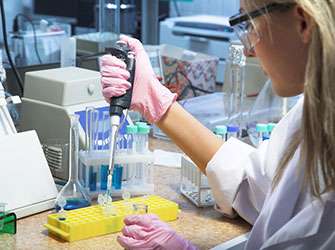New treatment option for subtype of aggressive lymphoma

An international team of researchers, including Lukas Kenner from the Clinical Department of Pathology at MedUni Vienna, has discovered a specific combination of mutations and new gene fusions, which are heavily implicated in tumour growth in patients with a particularly aggressive subtype of lymphoma (ALCL). The findings, which have now been published in the leading journal Cancer Cell, could lead to new targeted treatments for this disease and even to successful treatment of other types of cancer.
ALCL (anaplastic large cell lymphoma) is a particularly aggressive form of lymphoma. This type of cancer occurs mainly in children and adolescents and can be effectively treated with chemotherapy but, unfortunately, one third of patients do not respond to the conventional treatment. However, three years ago the Viennese researchers successfully treated a gravely ill patient with a therapy-resistant ALCL with a specific PDGFR (platelet-derived growth factor receptor) inhibitor. Within a mere ten days, this patient was tumour free. "The patient continues to be well and is living a completely normal life," reports Lukas Kenner of MedUni Vienna, who is Deputy Principal of the Ludwig Boltzmann Institute for Cancer Research (LBI-CR) and heads up the Department of Laboratory Animal Pathology at Vetmeduni Vienna.
Use of the PDFGR inhibitor was successful because, in this patient, the platelet-derived growth factor receptor beta (PDGFRB) is co-regulated by the NPM-ALK fusion gene, which is typical of this disease. It is not yet known how the disease is triggered in patients with ALCL who do not have the NPM-ALK fusion gene, who represent around 50% of all patients.
Mutation pairs identified
Using Next Generation Sequencing, the scientists have now analyzed genomes from 155 ALCL sufferers, who do not have the NPM-ALK fusion gene. The sequencing data showed that, in more than 38% of patients, the tumours displayed activating mutations in two particular genes, namely JAK-1 and STAT3.
The tumours were implanted in animals and then treated with inhibitors acting on STAT3 and JAK1. In all cases this treatment resulted in a significant reduction in tumour growth. The data show that drugs to block the JAK1/STAT3 signalling pathway therefore represent a new and effective strategy for treating this molecular subgroup of ALCLs. Since these two genes are on the same metabolic signalling pathway, tumour growth is driven by a dual-action, so to speak.
Although we do not yet have an effective inhibitor for STAT3, the mutation is generally dependent upon the activity of JAK1. Inhibiting drugs are available for JAK1 and these have the potential to limit the oncogenic effect of mutations related to STAT3 at the same time. These drugs have already been licensed by the Federal Drugs Agency (FDA) in the USA and could therefore be included in clinical trials without much delay. Kenner: "We can assume that this type of mutation also occurs in other types of cancer so that this discovery represents a general starting point for new cancer treatments."
More information: "Convergent Mutations and Kinase Fusions Lead to Oncogenic STAT3 Activation in Anaplastic Large Cell Lymphoma." dx.doi.org/10.1016/j.ccell.2015.03.006



















